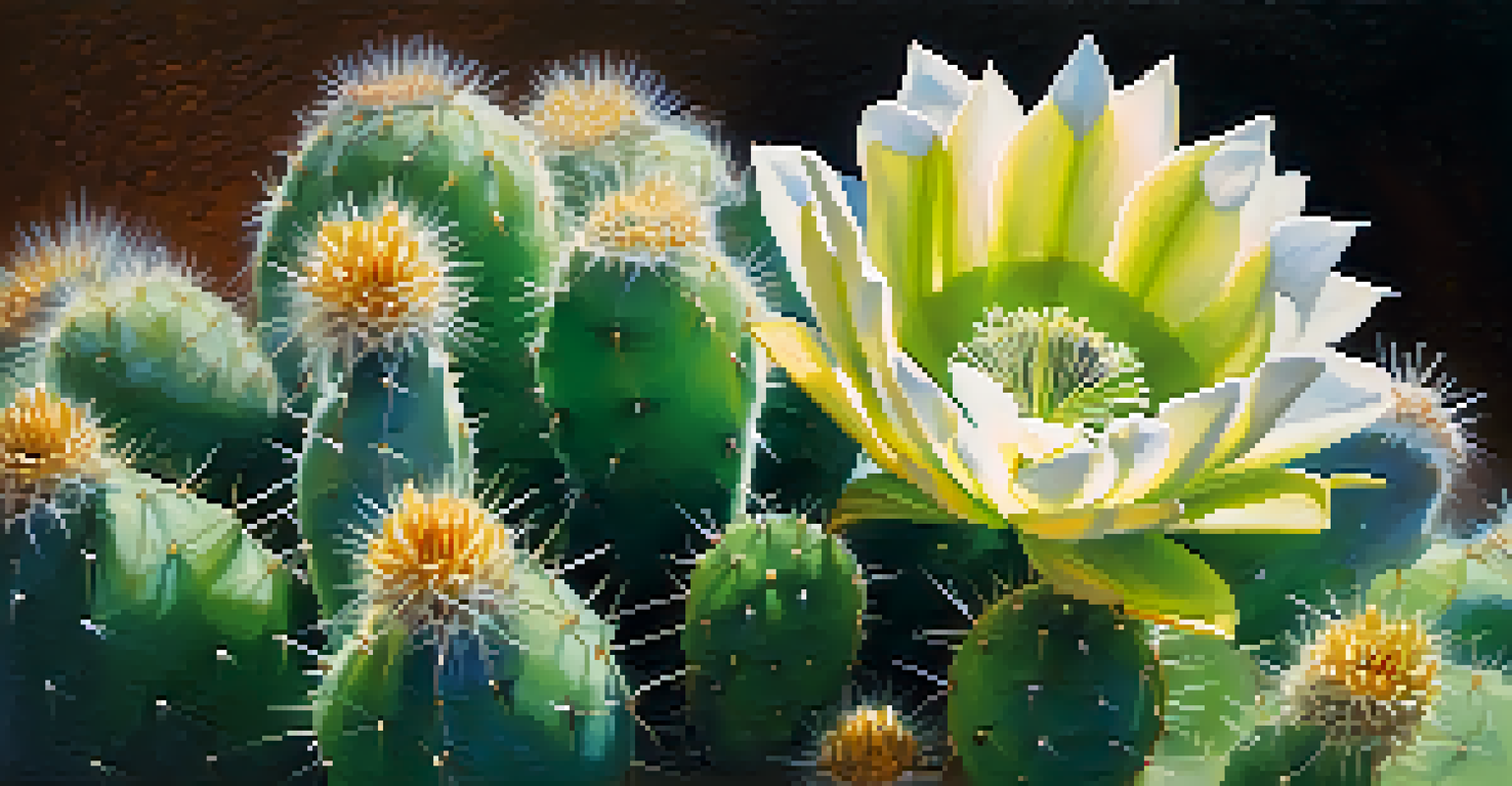Legal Status of Peyote: Implications for Ethical Use

Understanding Peyote and Its Cultural Significance
Peyote is a small cactus that contains the psychoactive compound mescaline, and it has been used for thousands of years in various indigenous cultures. Traditionally, it plays a central role in spiritual ceremonies, often helping participants connect with their beliefs and community. Its significance goes beyond mere use; it embodies the cultural practices and identities of Native American tribes.
The use of peyote is a means of bringing individuals into a deeper understanding of their own spirituality and connection to the world around them.
For these communities, peyote is not just a substance but a sacred gift that facilitates spiritual healing and insight. The rituals surrounding its use are deeply rooted in tradition and respect, emphasizing the importance of ethical consumption. Understanding this context is crucial when discussing its legal status and implications.
As we navigate the complex landscape of peyote use today, it's vital to approach it with sensitivity and respect for the cultures that have preserved this practice. Recognizing its cultural significance can guide us toward a more ethical dialogue about its use and regulation.
Current Legal Status of Peyote in the U.S.
In the United States, the legal status of peyote is a complicated issue that varies by context and location. Under the Controlled Substances Act, peyote is classified as a Schedule I substance, which generally makes it illegal to possess, distribute, or use. However, there are exceptions for members of federally recognized Native American tribes who use it in religious ceremonies.

This legal framework highlights a significant dichotomy: while peyote is illegal for most, it is protected for specific cultural and religious practices. This exception acknowledges the importance of peyote in Native American spirituality, yet it raises questions about equality and access for those outside these communities. Why should some have access while others do not?
Peyote's Cultural Importance
Peyote serves as a sacred element in indigenous cultures, facilitating spiritual healing and community connection.
Ultimately, the current legal landscape reflects a balancing act between preserving cultural traditions and addressing broader societal concerns. As discussions around drug policy evolve, the legal status of peyote continues to be a focal point in debates about drug use, spirituality, and ethics.
Ethical Considerations Surrounding Peyote Use
When discussing the ethical implications of peyote use, it's essential to consider the principles of respect, consent, and cultural appropriation. For non-Native individuals, using peyote outside its traditional context can be seen as appropriating a sacred practice. This raises ethical questions about who gets to use peyote and in what circumstances.
Respect for indigenous cultures and their practices is essential in any discussion about the use of sacred plants like peyote.
Moreover, the ethical use of peyote also involves understanding its impact on indigenous communities. As interest in peyote grows, there is a risk of commercialization and exploitation of the plant, which can undermine its cultural significance. Respecting the traditions and practices of Native American tribes is paramount in ensuring that their heritage is honored and preserved.
Ultimately, engaging with peyote ethically requires deep reflection on one's intentions and the potential consequences of those actions. It's a call to prioritize the voices of indigenous communities and to approach the experience with humility and awareness.
Peyote and Mental Health: A Double-Edged Sword
Peyote is often touted for its potential benefits in mental health, as many users report profound insights and emotional healing. Some studies suggest that substances like mescaline may alleviate symptoms of anxiety and depression, offering alternative approaches to conventional treatments. However, these benefits come with significant caveats.
The use of peyote for mental health must be approached with caution, especially outside its traditional context. Without the proper guidance and understanding, individuals may face adverse effects, such as psychological distress or a disconnection from reality. This emphasizes the importance of having a supportive environment and knowledgeable guidance when exploring its use for mental health purposes.
Legal Complexity of Peyote
In the U.S., peyote is illegal for most but protected for federally recognized Native American tribes, highlighting issues of access and equality.
Furthermore, the ethical implications of using peyote for self-medication cannot be overlooked. It raises the question of whether it is ethical to utilize a sacred plant for personal gain, especially when its cultural roots and significance are disregarded.
The Role of Regulation in Peyote Use
Regulation plays a critical role in shaping the landscape of peyote use, impacting both legal access and ethical considerations. While the current legal framework provides some protections for indigenous use, it can also create barriers for others seeking to explore peyote in a respectful manner. This raises questions about how regulation can evolve to reflect a more nuanced understanding of peyote's cultural significance.
Effective regulation could facilitate educational initiatives, ensuring that those who wish to use peyote do so in a manner that respects its traditions. By incorporating indigenous voices into the regulatory process, we can foster a more inclusive dialogue that acknowledges the complexities of peyote use. This could lead to a more balanced approach that honors both cultural heritage and individual exploration.
As society continues to grapple with issues surrounding drug policy, the regulation of peyote presents an opportunity for meaningful conversation. It's crucial to consider how regulations can protect cultural practices while also allowing for ethical exploration in a modern context.
The Future of Peyote Legislation and Ethics
Looking ahead, the future of peyote legislation and ethical use is uncertain, but it presents an opportunity for growth and understanding. As discussions about drug policy evolve, there is potential for more inclusive laws that reflect the cultural significance of peyote while addressing the needs of a diverse population. This could lead to a re-examination of how peyote is categorized and who has access to it.
Moreover, as awareness of indigenous rights and cultural preservation grows, there is a chance for more respectful engagement with peyote use. Education about its cultural background can empower individuals to approach peyote with the reverence it deserves, fostering a sense of accountability and respect. By prioritizing ethical considerations, we can create a sustainable framework for peyote use in the future.
Ethics of Peyote Use
The ethical implications of peyote use demand respect for indigenous traditions and caution against appropriation and commercialization.
Ultimately, the evolution of peyote legislation and ethics will depend on open dialogue and collaboration among diverse stakeholders. By listening to indigenous voices and recognizing their rights, we can pave the way for a more equitable and respectful approach to peyote in society.
Conclusion: Navigating the Complexities of Peyote
Navigating the complexities of peyote involves understanding its rich cultural heritage and the ethical implications of its use. While the legal status presents significant challenges, it also opens the door for vital conversations around respect, consent, and cultural preservation. As we engage in these discussions, we must prioritize the voices of indigenous communities, ensuring their rights and traditions are upheld.
Furthermore, the journey toward ethical peyote use requires a commitment to education and awareness. By fostering a culture of respect and understanding, we can create a more inclusive environment for discussing and exploring peyote's potential benefits and risks. It's not just about legality; it's about honoring a sacred tradition and the people who have kept it alive for generations.

In conclusion, the legal status of peyote and its ethical use is a multifaceted issue that calls for continuous reflection and dialogue. As society evolves, so too must our approach to peyote, blending respect for tradition with a responsible exploration of its potential.